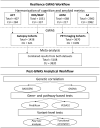Genetic variants and functional pathways associated with resilience to Alzheimer's disease
- PMID: 32844198
- PMCID: PMC7447518
- DOI: 10.1093/brain/awaa209
Genetic variants and functional pathways associated with resilience to Alzheimer's disease
Abstract
Approximately 30% of older adults exhibit the neuropathological features of Alzheimer's disease without signs of cognitive impairment. Yet, little is known about the genetic factors that allow these potentially resilient individuals to remain cognitively unimpaired in the face of substantial neuropathology. We performed a large, genome-wide association study (GWAS) of two previously validated metrics of cognitive resilience quantified using a latent variable modelling approach and representing better-than-predicted cognitive performance for a given level of neuropathology. Data were harmonized across 5108 participants from a clinical trial of Alzheimer's disease and three longitudinal cohort studies of cognitive ageing. All analyses were run across all participants and repeated restricting the sample to individuals with unimpaired cognition to identify variants at the earliest stages of disease. As expected, all resilience metrics were genetically correlated with cognitive performance and education attainment traits (P-values < 2.5 × 10-20), and we observed novel correlations with neuropsychiatric conditions (P-values < 7.9 × 10-4). Notably, neither resilience metric was genetically correlated with clinical Alzheimer's disease (P-values > 0.42) nor associated with APOE (P-values > 0.13). In single variant analyses, we observed a genome-wide significant locus among participants with unimpaired cognition on chromosome 18 upstream of ATP8B1 (index single nucleotide polymorphism rs2571244, minor allele frequency = 0.08, P = 2.3 × 10-8). The top variant at this locus (rs2571244) was significantly associated with methylation in prefrontal cortex tissue at multiple CpG sites, including one just upstream of ATPB81 (cg19596477; P = 2 × 10-13). Overall, this comprehensive genetic analysis of resilience implicates a putative role of vascular risk, metabolism, and mental health in protection from the cognitive consequences of neuropathology, while also providing evidence for a novel resilience gene along the bile acid metabolism pathway. Furthermore, the genetic architecture of resilience appears to be distinct from that of clinical Alzheimer's disease, suggesting that a shift in focus to molecular contributors to resilience may identify novel pathways for therapeutic targets.
Keywords: Alzheimer’s disease; GWAS; amyloid; reserve; resilience.
© The Author(s) (2020). Published by Oxford University Press on behalf of the Guarantors of Brain.
Figures





References
-
- Bull LN, van Eijk MJ, Pawlikowska L, DeYoung JA, Juijn JA, Liao M, et al.A gene encoding a P-type ATPase mutated in two forms of hereditary cholestasis. Nat Genet 1998; 18: 219–24. - PubMed
Publication types
MeSH terms
Grants and funding
- R01 MH109897/MH/NIMH NIH HHS/United States
- U24 AG021886/AG/NIA NIH HHS/United States
- P50 AG016574/AG/NIA NIH HHS/United States
- HHMI/Howard Hughes Medical Institute/United States
- U01 MH103392/MH/NIMH NIH HHS/United States
- P30 AG010161/AG/NIA NIH HHS/United States
- F31 AG059345/AG/NIA NIH HHS/United States
- R01 LM012535/LM/NLM NIH HHS/United States
- R01 AG057914/AG/NIA NIH HHS/United States
- R56 AG057191/AG/NIA NIH HHS/United States
- R01 AG046171/AG/NIA NIH HHS/United States
- UL1 TR000445/TR/NCATS NIH HHS/United States
- U01 AG046152/AG/NIA NIH HHS/United States
- R01 AG063689/AG/NIA NIH HHS/United States
- R37 MH057881/MH/NIMH NIH HHS/United States
- R01 AG056534/AG/NIA NIH HHS/United States
- U01 AG032984/AG/NIA NIH HHS/United States
- U01 AG061356/AG/NIA NIH HHS/United States
- R01 MH075916/MH/NIMH NIH HHS/United States
- U01 AG024904/AG/NIA NIH HHS/United States
- P50 AG008702/AG/NIA NIH HHS/United States
- U24 AG056270/AG/NIA NIH HHS/United States
- R01 AG017917/AG/NIA NIH HHS/United States
- RF1 AG054023/AG/NIA NIH HHS/United States
- R01 AG054047/AG/NIA NIH HHS/United States
- P50 AG005136/AG/NIA NIH HHS/United States
- R01 MH109677/MH/NIMH NIH HHS/United States
- U24 AG041689/AG/NIA NIH HHS/United States
- P30 AG066462/AG/NIA NIH HHS/United States
- R01 AG032990/AG/NIA NIH HHS/United States
- K99 AG061238/AG/NIA NIH HHS/United States
- R01 NS080820/NS/NINDS NIH HHS/United States
- P50 MH084053/MH/NIMH NIH HHS/United States
- R01 AG059716/AG/NIA NIH HHS/United States
- R01 MH097276/MH/NIMH NIH HHS/United States
- P30 AG066509/AG/NIA NIH HHS/United States
- P01 AG002219/AG/NIA NIH HHS/United States
- U01 AG006781/AG/NIA NIH HHS/United States
- HHSN271201300031C/DA/NIDA NIH HHS/United States
- S10 OD023680/OD/NIH HHS/United States
- K23 AG062750/AG/NIA NIH HHS/United States
- R01 MH093725/MH/NIMH NIH HHS/United States
- P50 AG005138/AG/NIA NIH HHS/United States
- U01 AG046139/AG/NIA NIH HHS/United States
- K12 HD043483/HD/NICHD NIH HHS/United States
- L30 AG048601/AG/NIA NIH HHS/United States
- P01 AG003949/AG/NIA NIH HHS/United States
- P30 AG062715/AG/NIA NIH HHS/United States
- U24 NS072026/NS/NINDS NIH HHS/United States
- K01 AG049164/AG/NIA NIH HHS/United States
- P30 AG019610/AG/NIA NIH HHS/United States
- P50 AG025711/AG/NIA NIH HHS/United States
- K24 AG046373/AG/NIA NIH HHS/United States
- R01 MH110921/MH/NIMH NIH HHS/United States
- P50 MH066392/MH/NIMH NIH HHS/United States
- K01 AG051718/AG/NIA NIH HHS/United States
- R01 NS100980/NS/NINDS NIH HHS/United States
- P01 AG017216/AG/NIA NIH HHS/United States
- R01 MH080405/MH/NIMH NIH HHS/United States
- RF1 AG051550/AG/NIA NIH HHS/United States
- R01 AG034962/AG/NIA NIH HHS/United States
- R01 AG018023/AG/NIA NIH HHS/United States
- R01 MH085542/MH/NIMH NIH HHS/United States
- R01 AG015819/AG/NIA NIH HHS/United States
- U01 AG006786/AG/NIA NIH HHS/United States
- R13 AG030995/AG/NIA NIH HHS/United States
LinkOut - more resources
Full Text Sources
Medical
Research Materials
Miscellaneous

